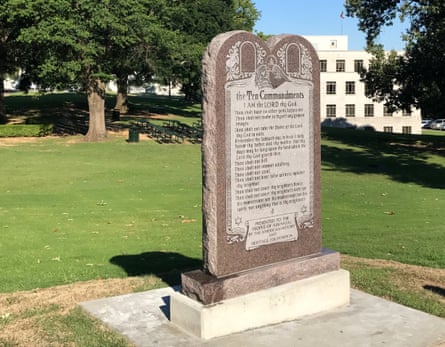A man shouting “Freedom!” has crashed a vehicle into a newly erected Ten Commandments monument in Arkansas.
The privately funded granite slab had been in place outside the state capitol in Little Rock for less than 24 hours before it was knocked from its plinth and smashed to pieces.
Michael Tate Reed, 32, of Van Buren in Arkansas, was arrested and taken to the Pulaski county jail shortly after 7.30am on preliminary charges of defacing objects of public interest, criminal trespass and first-degree criminal mischief. An arrest report lists his occupation as unemployed/disabled.The Arkansas secretary of state’s office spokesman, Chris Powell, said officials believed a Facebook Live video posted on an account under the name of Michael Reed appeared to show the destruction was authentic.
In the video, the sky is dark and the Arkansas capitol’s dome is visible. Music is heard followed by a female voice, likely on the radio, saying: “Where do you go when you’re faced with adversity and trials and challenges?”

The driver is then heard growling: “Oh my goodness. Freedom!” before accelerating into the monument. The vehicle’s speedometer is shown at 21mph and then a collision can be heard. The monument falls and smashes as its hit the ground.
Oklahoma county sheriff’s spokesman, Mark Opgrande, said on Wednesday Reed had previously been arrested in October 2014 over the destruction of Oklahoma’s Ten Commandments monument at the state capitol.
In a 2015 email to Tulsa World , Reed apologised for wrecking Oklahoma’s monument and said he suffered from delusions and heard voices. “I am so sorry that this all happening (sic) and wished I could take it all back,” he said.
Arkansas’ monument weighed 2,721kg (6,000lb). It was installed on Tuesday morning on the south-west lawn of the capitol with little fanfare.
A 2015 law required the state to permit the display near the capitol, and a state panel last month approved its design and location.
“Obviously, I’m very disappointed that someone would carry out an act of violence that’s actually against the people of Arkansas,” said Jason Rapert, a Republican senator who led the push for the monument. Rapert said he was confident he could quickly raise funds for a replacement.
Travis Story, the general counsel of the American History and Heritage Foundation, which raised money for the monument, said the group had ordered a replacement but it would take a couple of months.
The Republican governor Asa Hutchinson, who signed the legislation requiring the monument’s installation, tweeted that “resorting to property destruction is never the answer to a policy disagreement”.

The American Civil Liberties Union (ACLU) condemned the destruction of the sculpture, which it called an unconstitutional endorsement of religion.
“We strongly condemn any illegal act of destruction or vandalism,” Rita Sklar, the executive director of ACLU of Arkansas, said. “The ACLU remains committed to seeing this unconstitutional monument struck down by the courts and safely removed through legal means.”
Arkansas’ monument is a replica of a display at the Texas capitol that was upheld by the US supreme court in 2005. After the destruction of the monument in Oklahoma, a replacement was installed but then ordered to be removed by that state’s supreme court, which determined its location on state property violated a constitutional prohibition on the use of state funds to support a religion.
Reed’s family members told the Oklahoman newspaper in 2014 that he had bipolar disorder and schizophrenia.
The Oklahoma county district attorney said he declined to pursue criminal charges against Reed because it was apparent he had a long history of mental illness and because the offence was a property crime.
David Prater added that Reed’s family lived in Arkansas and had secured a facility there that could treat him. “Had it been a violent crime where he had harmed another person, burglarised someone’s home or something like that, I would have been forced to handle the case differently,” Prater said.